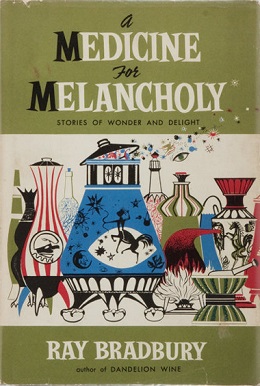
A Medicine for Melancholy (1959) is a collection of short stories by American writer Ray Bradbury. It was first published in the UK by Hart-Davis in 1959 as The Day It Rained Forever with a slightly different list of stories. All of the included stories were previously published.

The Stories of Ray Bradbury is an anthology containing 100 short stories by American writer Ray Bradbury, first published by Knopf in 1980. The hundred stories, written from 1943 to 1980, were selected by the author himself. Bradbury's work had previously been collected in various compilations, such as The Martian Chronicles and The October Country, but never in such a large volume or spanning such a long period of time.
"The Pedestrian" is a science fiction short story by American writer Ray Bradbury. Originally published in the August 7, 1951 issue of The Reporter by The Fortnightly Publishing Company, the story was included in the collection The Golden Apples of the Sun (1953), but was dropped from later editions of this collection.
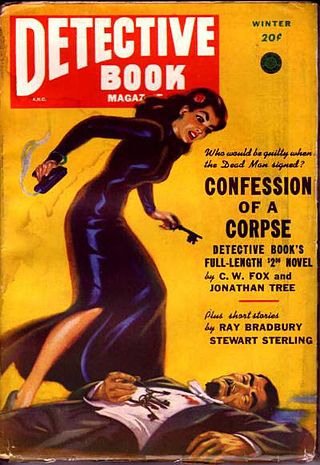
"The Fruit at the Bottom of the Bowl" is a short story by Ray Bradbury. It was first published in Detective Book Magazine in November 1948 as "Touch and Go". The story was re-titled and published as "The Fruit at the Bottom of the Bowl" in EQMM in January 1953.

Twice 22 is a collection of short stories by American writer Ray Bradbury. The book, published in 1966, is an omnibus edition of The Golden Apples of the Sun and A Medicine for Melancholy. It is titled Twice 22 on the book's dustjacket and spine, but titled Twice Twenty-two on the book's title page.

The Small Assassin (1962) is a short story collection by American writer Ray Bradbury. The stories originally appeared in the magazines Dime Mystery Magazine, Weird Tales, Harper's, Mademoiselle, and in Bradbury's first book, Dark Carnival.

The Autumn People is a mass-market paperback collection of comic adaptations of eight short horror and crime stories by Ray Bradbury, gathered from the pages of the EC Comics comic books of the 1950s. It is one of five EC collections published by Ballantine Books between 1964 and 1966, and one of two made up of comic adaptations of Bradbury's work. The presentation of the material is problematic at best, since the color comic book pages are represented in black and white and broken into horizontal strips to fit the mass-market paperback format. Still, the collections are historically important. They were the first attempt to resurrect the EC comics, only a decade after public outcry had driven them off the racks. They were the first introduction of those comics to a generation of readers too young to remember them in their first run.
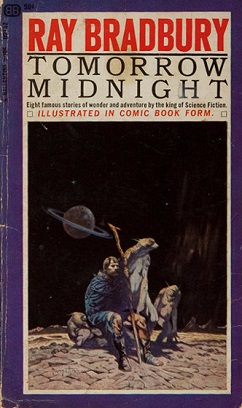
Tomorrow Midnight is a mass-market paperback collection of comic adaptations of eight short science fiction stories by Ray Bradbury, gathered from the pages of the EC Comics comic books of the 1950s. It is one of five EC collections published by Ballantine Books between 1964 and 1966, and one of two made up of comic adaptations of Bradbury's work. The presentation of the material is problematic at best, since the color comic book pages are represented in black and white and broken into horizontal strips to fit the mass-market paperback format. Still, the collections are historically important. They were the first attempt to resurrect the EC comics, only a decade after public outcry had driven them off the racks. They were the first introduction of those comics to a generation of readers too young to remember them in their first run.

Long After Midnight is a short story collection by American writer Ray Bradbury. Several of the stories are original to this collection. Others originally appeared in the magazines Planet Stories, Collier's Weekly, Playboy, Esquire, Welcome Aboard, Other Worlds, Cavalier, Gallery, McCall's, Woman's Day, Harper's, Charm, Weird Tales, Eros, and Penthouse.

The Mummies of Guanajuato is a 1978 book which reprints Ray Bradbury's novelette, "The Next in Line", illustrated with photographs, by Archie Lieberman, of the actual mummies discovered in Guanajuato which inspired the story. The story originally appeared in Bradbury's first book, Dark Carnival, in 1947.
The Fog Horn & Other Stories is a collection of six short stories written by Ray Bradbury. The collection, published in Japan, is published in English for school use.
The Fog Horn and Other Stories is a collection of four short stories by Ray Bradbury. The collection, published in Japan, is published in English for school use.

The Last Circus & the Electrocution is a 1980 collection of two short stories by Ray Bradbury. "The Last Circus" is original to this collection. "The Electrocution" first appeared in The Californian in 1946 under the pseudonym William Elliot.
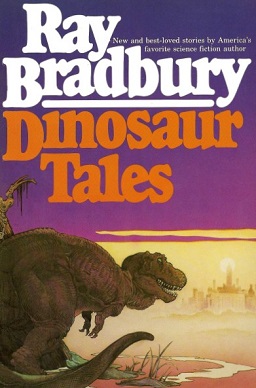
Dinosaur Tales is a 1983 short story collection by Ray Bradbury. Several of the stories are original to this collection. Other stories were first published in Collier's and The Saturday Evening Post magazines. The collection contains over 60 pages of illustrations by Gahan Wilson, William Stout, Steranko, Moebius, Overton Loyd, Kenneth Smith and David Wiesner.
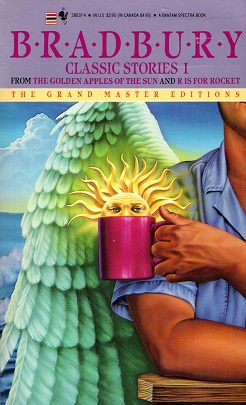
Classic Stories 1: From The Golden Apples of the Sun and R is for Rocket is a semi-omnibus edition of two short story collections by Ray Bradbury: The Golden Apples of the Sun (1953) and R is for Rocket (1962).

The Parrot Who Met Papa is a 1991 collection of two short stories bound dos-à-dos. The first story is "The Parrot Who Met Papa" by Ray Bradbury. The other, "The Parrot Who Met Papa (concluded)" is by David Aronovitz, who also published the book. The Bradbury story first appeared in the magazine Playboy in 1972.
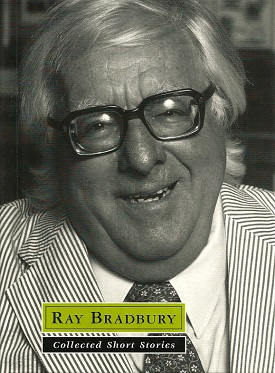
Ray Bradbury Collected Short Stories is a collection of three short stories by Ray Bradbury. It was published in 2001 as part of Peterson Publishing's The Great Author Series. The stories originally appeared in the magazines The Saturday Evening Post and New Story.

From the Dust Returned is a fix-up fantasy novel by Ray Bradbury published in 2001. The novel is largely created from a series of short stories Bradbury wrote decades earlier, centering on a family of Illinois-based monsters and ghosts named the Elliotts. The six previously published stories originally appeared in the magazines The Saturday Evening Post, Mademoiselle and Weird Tales as well as Bradbury's earlier collections Dark Carnival and The Toynbee Convector. Two of the stories, "Homecoming" and "Uncle Einar", were also anthologized in The October Country. Three new short stories are included, as well as several chapters to help connect the stories.
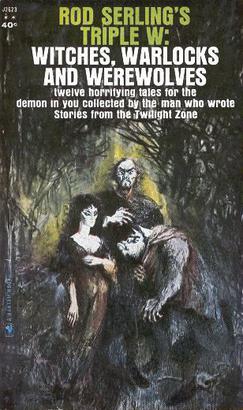
Rod Serling's Triple W: Witches, Warlocks and Werewolves is an anthology of fantasy and horror stories edited by Rod Serling and ghost edited by Gordon R. Dickson. It was first published by Bantam Books in 1963. Most of the stories originally appeared in the magazines Fantasy and Science Fiction, Unknown, New England Magazine, Fantastic, The Pioneer and Beyond Fantasy Fiction.

The Best Science Fiction Stories: 1952 is a 1952 anthology of science fiction short stories edited by Everett F. Bleiler and T. E. Dikty. An abridged edition was published in the UK by Grayson in 1953 under the title The Best Science Fiction Stories: Third Series. The stories had originally appeared in 1951 and 1952 in the magazines Super Science Stories, Fantasy and Science Fiction, Galaxy Science Fiction, Worlds Beyond, Startling Stories, New Worlds, Marvel Science Fiction, Esquire, Man’s World and Suspense Magazine.
















